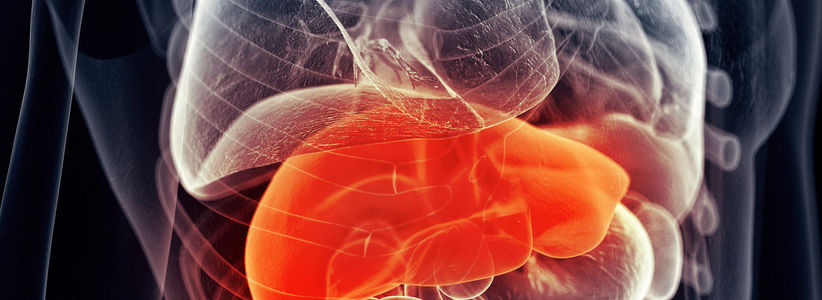Symbolic launch of the 1st International NASH Day

12th June 2018
Today (12 June) marks the 1st International NASH Day and an opportunity for NASH specialists in research centres across the world to raise the profile of the disease with patients, general public and colleagues.
NASH is an acronym that stands for Non-Alcoholic Steato Hepatitis. It is the most severe form of non-alcoholic fatty liver disease (NAFLD). This is the most common cause of chronic liver disease in developed countries – the third most common cause of premature death in the UK – and its prevalence is projected to increase globally in association with obesity and type 2 diabetes.
Yet NASH operates in silence. As a chronic yet silent disease, most patients live with it for several years without experiencing any symptoms. As a result it remains poorly-known, under-diagnosed, and represents a growing global public health issue in most countries worldwide.
NASH can progress to more serious disease stages, such as advanced fibrosis, cirrhosis, liver failure or liver cancer. There is no approved treatment, therefore early recognition of the disease, monitoring progression and effective treatment in patients is urgently required to reduce deaths from end-stage liver disease.
International NASH Day is first-of-its-kind disease awareness event and is designed to target every individual personally and/or professionally implicated by NASH, paving the way for better care for millions of NASH patients in the future. It is organised by The NASH Education Program, an independent endowment fund set-up to increase awareness about NASH.
In a world first for NASH – Scotland has been awarded £1.7m of Innovate UK funding to develop a unified data system that allows sharing of genomic (RNA-Seq) and clinical information from patients with NASH, making it more accessible for further research.
Known as a Data Commons, it will lead to a deeper understanding of which tests and treatments are most effective for individual patients. The project has been titled SteatoSITE, and is led by Stratified Medicine Scotland and industry partner, Eagle Genomics, an artificial intelligence-augmented knowledge discovery company, and will involve partners at Edinburgh and Glasgow universities, NHS Scotland and Glasgow’s Medical Research Council (MRC) Molecular Pathology Node.
It will bring together world-class clinical expertise, data and access to research samples. The project will involve RNA sequencing of 1000 liver biopsy samples from NHS Scotland’s biorepository network by Edinburgh Genomics, a global leader in sequencing and genomics. This new data will be combined with information from imaging, clinical and electronic health records.
Charles Weller, General Manager, NHS Research Scotland Central Management Team said:
“This project exemplifies the infrastructure and expertise in Scotland to tackle complex disease. Led by Stratified Medicine Scotland and Eagle Genomics it brings together a truly multi-disciplinary team consisting of clinicians, data scientists, pathologists, computer scientists and industry. By working in collaboration they can determine what information is needed to be able to find new treatments, aid diagnosis and assess effectiveness of treatments. As more data is added, it will evolve into a smarter, more comprehensive knowledge system that will assist important discoveries in chronic liver disease and increase the success of treatments. It positions Scotland as a leader in this field”.
Diane Harbison, SMS-IC chief executive, said:
“Scotland is a world leader in terms of the health data it has available, and this project is a great example of making most of this data in order to identify successful treatments and improve our ability to ensure each patient gets the right treatment. NAFLD is a massive health problem which affects large swathes of the population, not just in Scotland but globally, and there is a desperate need for potential treatments. Taking a stratified approach – ensuring treatments are targeted based on each individual patient’s genes – means they are more likely to be successful.”
Dr Jonathan Fallowfield, from the MRC Centre for Inflammation Research in Edinburgh, said:
“Sharing information through this new data repository will be transformative for research efforts to better understand the disease. It will help to pinpoint patients at high risk of disease progression and will speed up the development of new therapies.”
Dr Steven Burke, Industry Liaison Manager, NHS Research Scotland said:
“Scotland is fortunate to have world-leading hepatology expertise across the country. This has already been shown in our work on HCV, where Scotland led the creation of one of the largest HCV clinical database and biobank resources in the world. Ambition to replicate this work with a NASH registry is testament to the collaborative research environment in Scotland where our NASH clinicians work as a cohesive unit to drive forward research and accelerate the development of new treatments. Its an attractive model for industry and allows us to harness our combined research strengths to tackle this growing public health issue”
Follow activity through the day via #NASHday and #steatosite.
Notes
- Full information on the NASH Education programme is available here
- A range of educational videos addressing different dimensions of NASH: definition of the pathology, diagnosis, prevalence, risk factors, treatment and outcomes are available here
Eagle Genomics and the Stratified Medicine Scotland Innovation Centre (SMS-IC) were awarded a £1.7M collaborative grant from Innovate UK (the UK’s innovation agency) on 7 February 2018 for a ground-breaking project that could help develop new tests and treatments for patients with non-alcoholic fatty liver disease (NAFLD). More information here - A Data Commons co-locates data, storage and computing infrastructure, and is a commonly used tool for analysing and sharing data to create a resource for patients, charities, clinicians and the research community
- Scotland led the creation of one of the largest HCV clinical database and biobank resources in the world, showcasing world-leading hepatology expertise across the country. More information here

